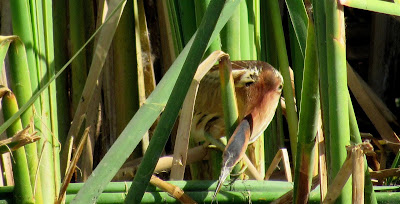I am really glad I did. It is often difficult to raise oneself on Friday afternoon after a full week's work.
The reason I am so glad is because I saw my first little bittern in Mauritania at the lake.
I flushed it from the open as I walked round but tracked it in flight and worked very hard to refind it. I wasn't going to let this one go.
little bittern 1
Luckily it had dropped down at the front of one of the reed beds. Sometimes little bittern fly into the beds and are lost.
little bittern 2
It was not immediately recognisable to me. It has a browner face and neck than the nominate species I am used to.
little bittern 3
I deduce from this that this is not a migrant but a dispersed bird of the African sub-species payesii.
little bittern showing a chestnut-brown neck
I got very good views of the bird and it allowed me close. You can clearly see from the above photograph that it has the chestnut-brown neck characteristic of payesii.
The distribution maps show it normally only disperses as far north as the Senegal River Delta so this is well out of its known range. North Nouakchott Lake is developing a track record for finding birds doing this. The closest similar result was a dwarf bittern seen there in January.
northern pintail
Another odd bird for the location was a northern pintail. This is almost certainly the same bird as was observed two weeks ago. My guess is it will now try to over-summer.
mostly Eurasian coot
The uniqueness of this lake should not be understated. It is the only place in sub-Saharan Africa where Eurasian coot breed.
mostly little grebe
adult African swamphen
There were no migrant waders at all this time. Indeed the only waders were the resident spur-winged lapwing.
spur-winged lapwing
The only migrants of any type were three barn swallow, one sand martin and a very late common swift.
red-billed quelea
Once again I inspected the sparrow flocks for oddities and came up with one red-billed quelea.
Sudanese golden sparrow
Other species which I don't always see at the lake were western reef heron (2) and squacco heron (2).
Little bittern is species 260 on my Mauritanian list and is a fillip to me as I am grounded in Nouakchott until the end of Ramadan.












Wrong, Robert ! Eurasian coot bred in north Senegal... http://ornithondar.blogspot.sn/2014/01/12-khant-nord-1ere-preuve-de.html
ReplyDeletehttp://ornithondar.blogspot.sn/2017/05/16-quelque-trois-cent-foulques.html